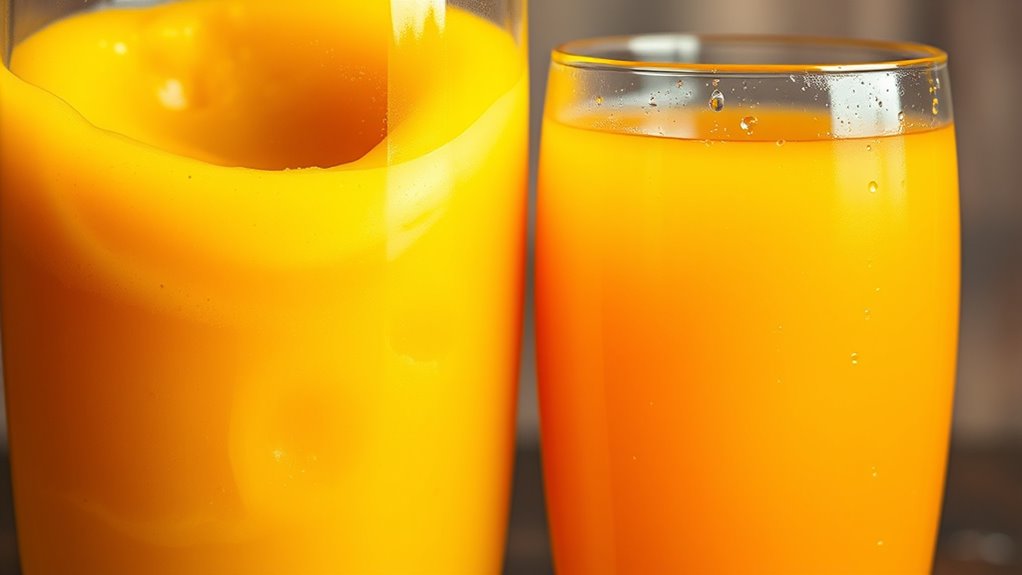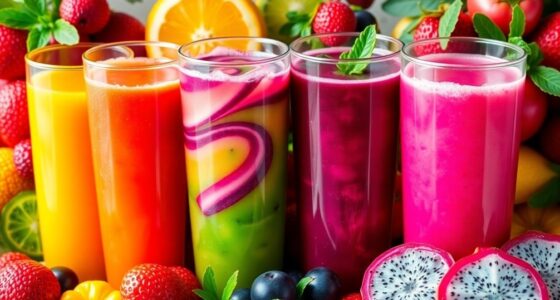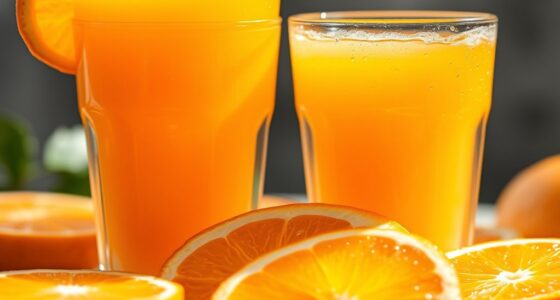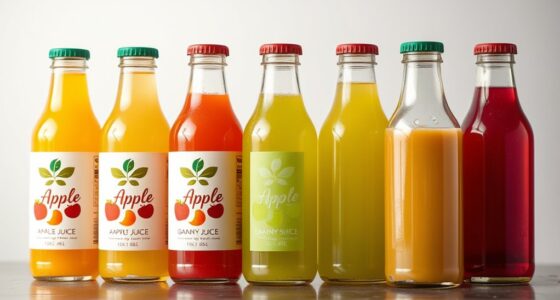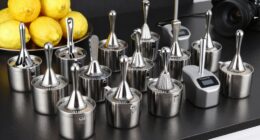When choosing between puree-based and pressed mango juice, consider your texture and nutritional preferences. Puree juice offers a thicker, fiber-rich drink that retains more vitamins and antioxidants, making it great for health benefits. Pressed mango juice is lighter, more invigorating, and usually involves minimal processing. Your choice depends on whether you want a hearty or lighter beverage. Keep exploring to discover how these differences can enhance your mango juice experience.
Key Takeaways
- Puree-based mango juice retains more nutrients, fiber, and antioxidants due to minimal processing.
- Pressed mango juice is lighter, more liquid, and involves fewer steps, offering quick refreshment.
- Purees have a thicker, denser texture, providing a more satisfying mouthfeel and potential for added health benefits.
- Pressed juice may have a milder flavor and fewer nutrients, but emphasizes hydration and natural sweetness.
- Both types depend on mango quality and harvesting methods, influencing flavor, nutrition, and overall juice quality.
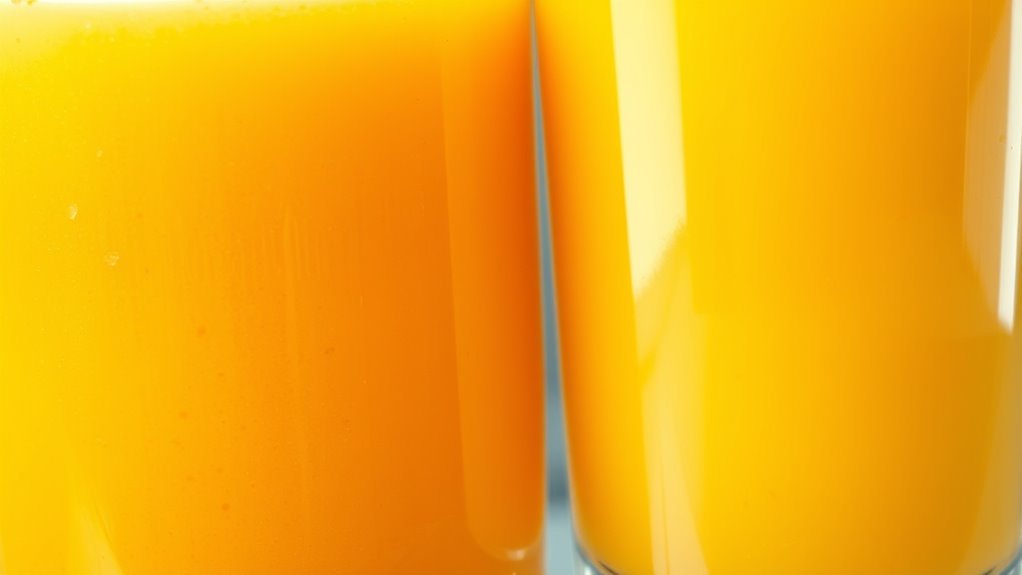
Mango juice, with its vibrant hue and sweet aroma, is a popular beverage enjoyed worldwide. When you choose between puree-based and pressed mango juice, understanding how each is crafted can help you make better choices. But before diving into that, it’s worth appreciating the journey of mango cultivation. Mango trees thrive in tropical and subtropical regions, where warm temperatures and rich soil create ideal conditions. As you learn about mango cultivation, you’ll see how the careful farming and harvesting process influence the quality of the fruit, and ultimately, the juice. High-quality mangoes, harvested at the right ripeness, ensure that the juice retains its natural sweetness and nutritional value.
When you opt for puree-based mango juice, it’s typically made by blending mashed mango pulp into a smooth, thick consistency. This method often preserves more of the fruit’s natural fiber, vitamins, and antioxidants, which are linked to numerous health benefits. Mangoes are rich in vitamin C, vitamin A, and polyphenols, all of which support your immune system, improve skin health, and may even help protect against certain chronic diseases. Because purees contain less processing, they tend to retain more of these nutrients, making them a health-conscious choice. Plus, the thick texture of puree-based juice can be more satisfying and filling, giving you a sense of fullness while still enjoying the fruity flavor.
On the other hand, pressed mango juice is made by extracting liquid directly from fresh mangoes, often using a juicer or press. This method results in a lighter, more liquid consistency, which some people prefer for a revitalizing beverage. The pressing process involves minimal steps, usually just extracting juice from ripe mango flesh, which helps preserve the natural sweetness without added sugars or preservatives. However, because pressing often involves filtering out pulp and fiber, this type of juice might offer fewer health benefits compared to puree-based options. Nonetheless, pressed mango juice still delivers a good dose of vitamins and hydration, perfect for quenching your thirst.
Additionally, choosing cost-effective strategies like purchasing in bulk or making your own juice at home can maximize your health benefits while minimizing expenses. When you’re choosing between the two, consider your health goals and taste preferences. If you’re after maximum health benefits and more fiber, puree-based mango juice is a better choice. If you prefer a lighter, more straightforward drink, pressed mango juice suits you well. Both types, when made from ripe, quality mangoes, deliver the delicious, tropical experience you seek. Remember, the quality of the mangoes and how they’re processed profoundly influence the nutritional value and flavor. So, next time you reach for mango juice, think about how it’s made and what benefits you want to get from this vibrant, nutritious beverage.
Frequently Asked Questions
Which Type of Mango Juice Contains More Nutrients?
Pressed mango juice generally contains more nutrients because it retains more of the fruit’s natural vitamins, minerals, and antioxidants through minimal processing. When you choose pressed juice, you’re likely to enjoy greater nutrient retention, which enhances the health benefits. Puree-based juices often undergo more processing, which can reduce some nutrients. So, for maximum health benefits, pressed mango juice is your better option.
How Does Processing Affect Mango Juice’s Flavor?
Processing impacts mango juice’s flavor considerably. When you process juice, it can alter the natural flavor, sometimes dulling its freshness or adding a cooked taste. To preserve the original flavor, manufacturers often use gentle methods like cold pressing or minimal heat. Your best choice for authentic flavor is juice with less processing, as it retains more of the fruit’s natural sweetness and aroma, ensuring a fresher, more vibrant taste.
Is Puree-Based Mango Juice More Affordable Than Pressed?
Think of puree-based mango juice as a quick, ready-made meal, while pressed juice is like a homemade dish—more effort, often higher cost. Generally, puree-based juice is more affordable because it involves lower production costs and simpler processing. You might find it cheaper at the store, especially when compared to pressed juice, which requires more steps and fresh fruit, driving up the overall price.
Can Pressed Mango Juice Be Stored Longer Than Puree-Based?
Pressed mango juice generally has a longer shelf life than puree-based juice if stored properly. To maximize storage time, keep it in a sealed, airtight container and refrigerate at or below 40°F. Pasteurization also helps extend its freshness. While puree-based juice might spoil faster, pressed juice’s minimal pulp and natural enzymes allow for more extended storage, making it a better choice if you want longer-lasting mango juice.
Which Method Retains More Natural Mango Aroma?
You’ll find pressed mango juice retains more natural aroma, thanks to minimal processing that preserves the fruit’s original scent. notably, studies show pressed juices maintain up to 80% of their aroma compounds, resulting in richer flavor intensity. In contrast, puree-based juices often lose some aroma during blending and pasteurization. So, if aroma preservation matters most, pressed mango juice is your best choice for a fresher, more vibrant taste experience.
Conclusion
So next time you’re picking up mango juice, remember that the choice between puree-based and pressed isn’t just about flavor—it’s about experience. Coincidentally, I found myself craving both types during a recent visit to the market, realizing how each offers a unique taste of summer. Whether you prefer the smooth sweetness of puree or the vibrant freshness of pressed, trust your instincts. After all, sometimes it’s those little coincidences that lead to the best discoveries.
Cindy thoroughly researches juicing trends, techniques, and recipes to provide readers with practical advice and inspiration. Her writing style is accessible, engaging, and designed to make complex concepts easy to understand. Cindy’s dedication to promoting the advantages of juicing shines through her work, empowering readers to make positive changes in their lives through the simple act of juicing.

